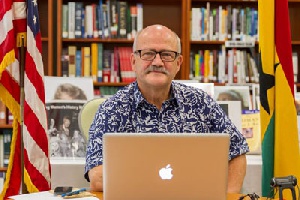 USAID Mission Director for Ghana, James A. Bever
USAID Mission Director for Ghana, James A. Bever
USAID Mission Director for Ghana, James A. Bever, in March 2015 disclosed that monies given to Ghana were not free.
He stated that these monies belong to American taxpayers and expect to see dividends anytime such monies were given out to Ghana.
USAID in 2013 and 2014, provided about $45 million to support three main areas of Ghana’s economy which included helping to preserve offshore fisheries along Ghana’s coastal areas, equipping smallholder farmers (single-headed households), especially women up north to increase their yield; and support commercial farmers.
Read the full story originally published on March 25, 2015 by Business Day
USAID Mission Director for Ghana, James A. Bever says Ghanaians should not see financial aid from America as a give-away but treat it with the same radicalism and rigour as the rest of state spending.
“The monies we dole out to Ghana belong to American taxpayers and we expect to see dividend anytime such monies are given out to Ghana. We expect the aid to help boost trade, as well as help produce more healthy and educated Ghanaians,” Mr. Bever told journalists in Accra last week.
USAID has over the last two years, provided about $45 million to support three main areas of Ghana’s economy which include helping to preserve offshore fisheries along Ghana’s coastal areas, which has seen a steady decline recently; equipping smallholder farmers (single-headed households), especially women up north to increase their yield; and supporting commercial farmers.
Mr Bever, who is ending his two-year tour of duty in Ghana, said the investments made by his outfit during his term of office are beginning to yield positive results. Feed the Future project is one of the interventions, which aims to spur sustainable and broadly shared economic growth in the northern regions of Ghana. The project has helped smallholder farmers, especially women, to improve production with an initial number 30 farmers growing to 35,000. He was optimistic that the beneficiaries would grow to 100,000.
“In most cases, the farmers had quadrupled the production of their yearly produce, in mostly grains like rice, soya, and maize,” he said.
He added that “It is a sustainable model and we are extremely excited about it. I think Ghana is in the path to an agricultural revolution that really can turn the northern part of the country to a bread basket and reduce imports.”
On the energy crisis, the outgoing USAID Country Director said the short-term measure that government has adopted to address the country’s power crisis by procuring power barges from Turkey would be expensive.
According to him, government would have to commit a lot of funds to the project in order to assure the private operators of the power barges that they would be paid for their services in future.
“The options that your government has identified in trying to get some power barges mounted, which are basically mobile power generation equipment, is a short-term solution but it is going to be expensive and the country is going to have to come up with the funds to assure the suppliers that they are going to get paid because it is a private deal. The equipment runs on fossil fuel and it is going to cost you something,” Mr. Bever stated.
The government had earlier announced that the two power barges would generate about 450 megawatts (MW) to help stabilize the situation. The power barges are expected in the country by the end of April 2015.
He disclosed that apart from the procurement of the power barges, it would be difficult for government to come up with other short-term solutions without the resuscitation of the thermal plants in Takoradi.
“The good news is the world oil prices have dropped in half so those refined products that are used to power those barges should be more affordable than it would have otherwise. But in the short-term, there is no other solution, the faster they can get the power plant operating again in Takoradi and adjust it to be able to burn oil, gas the better. To an extent Ghana can persuade Nigeria to honour its commitments in the West African Pipeline accord, that too would help the country,” he said.
He however urged government to work hard to improve power generation capacity, which would take a few years but would address the country’s power crisis in the long term.
Watch the latest episode of BizTech below: